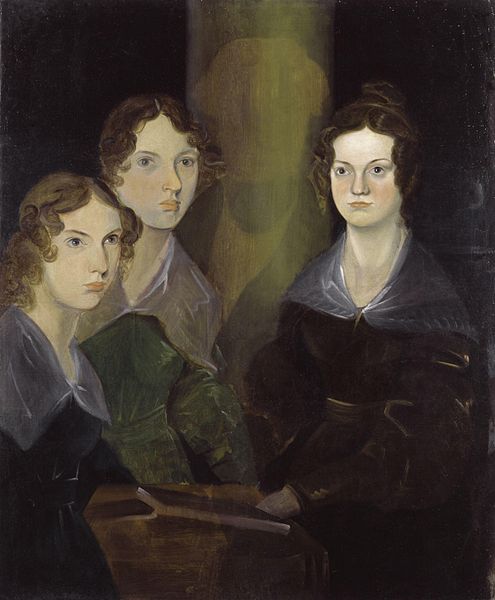The Brontë Sisters, by Patrick Branwell Brontë, National Gallery
Barker wrote her book with the express purpose of refuting the Brontë mythos (isolated savage upbringing on the moors), revealing the family as they really really were, and salvaging the reputations of Patrick (Brontë père) and Branwell (Brontë frère). Because this is my first foray into Brontë biography, I cannot tell you what has happened since in Brontë scholarship, nor acquaint you, personally, with what went before and wrought up Barker to such a fever pitch of repudiation.
What I can say is that it is a big fat book, very entertaining, and, I should think, meticulously researched. Some readers may be put off by the chapters about Patrick, long ere the appearance of his children (on the literary scene, or at all), but I was charmed by his decades-long efforts to clean up the Haworth water supply (though I was surprised that Barker didn’t make the connection between the waterworks and Haworth curate/possible love interest William Weightman’s agonizing death from cholera), to get his poetry published, and to survive small town political skulduggery. Readers who, like me, are unacquainted with the biographical details except those derived from the very Brontë mythos that Barker deplores, will be surprised to see that Haworth in the first half of the nineteenth century was a not-unprosperous industrial town and transit hub with thousands of inhabitants, and not the lonely hamlet that it became after industry left, and in which visitors today can feel claustrophobic. We will also be surprised to see, from the evidence of hundreds of letters, journal entries, and interviews, that Patrick Brontë was not a crazed tyrannical hermit who starved his daughters; that Charlotte, Emily, and Anne regularly attended concerts and lectures, subscribed to the lending library, read the papers voraciously, and did a lot of entertaining (Emily baked and managed the household; Charlotte couldn’t even order a chop); and that Arthur Nicholls, Charlotte’s unfortunate husband, actually did enjoy and encourage her writing, rather than repressing it. We also get ample evidence of where the “ë” came from. Good stuff.
Continue reading
